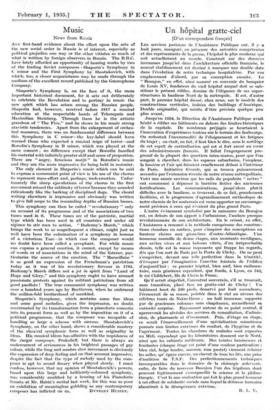Music News from Russia ANY first-hand evidence about the effect
upon the arts of the new social, order in Russia is of interest, especially as political prejudice one way or the other vitiates so much of what is written by foreign observers in Russia. The B.B.C. have lately afforded an opportunity of hearing works by two of the leading Soviet composers—Shaporin's Symphony in C 'minor and the First Symphony by Shostakovich, with which, too, a closer acquaintance may be made through the medium of the excellent record published by the Gramophone Company.
Shaporin's , Symphony is, on the face of it, the more important historical document, for it sets out deliberately to celebrate the Revolution and to portray in music the new spirit which has arisen among the Russian people. Shaporin had, however, received before 1917 a musical education at the respectable hands of Tcherepnin and Maximilian Steinberg. Through them he is the artistic grandson of " The Five," and he shows in his music strong atavistic tendencies. Apart from the enlargement of orches- tral resources, there was no fundamental difference between this Symphony in C minor—the key-label should have 'warned those who expected a musical reign of terror—and Borodin's Symphony in B minor, which was played at the same concert ; no difference except that Borodin handled his material with infinitely greater skill and sense of proportion. There are " angry, ferocious motifs" in Borodin's music and they are the more impressive for being held in restraint.
The only element in Shaporin's music which can be said to express a communist point of view is his use of the chorus to represent mass-effort and, perhaps,'mob-emotion. Unfor- tunately the sharp ejaculations of the chorus in the -first movement missed the sublimity of terror'because they sounded ridiculously like the barking of disciplined dogs. The choral writing elsewhere is impressive and obviously was written to give full scope to the resounding depths of Russian basses.
This symphony can then be called " revolutionary " only on account of its programme and of the associations of two tunes used in it. These tunes are of the patriotic, martial type which has been used in all countries and under all regimes to stir men to action. " Budenny's March," which brings the work to so magniloquent a climax, might just as well have been the culmination of a symphony in honour of a victorious Tsar—in which case the composer would no doubt have been called a sycophant. For while music can express a general emotion, it cannot, except by means of words or of associations in the mind of the listener, par- ticularize the source of the emotion. The " Marseillaise " is as goOd an expression of the Frenchman's patriotism today as it was of his revolutionary fervour in 1792. Budenny's. March differs not a jot in spirit from "Land of Hope and Glory," and this symphony ought to have aroused passionate protests against its militant patriotism from all good pacifists ! The true communist symphony was written over a hundred years ago by Beethoven, when he embraced the million-fold brotherhood of mankind.
Shaporin's Symphony, which contains some fine ideas and some good melodies, gives the impression, no doubt accentuated by its transformation from a pianoforte concerto into its present form as well as by the imposition on it of a political programme, that the composer was incapable of handling so large a scheme with success. Shostakovich's Symphony, on the other hand, shows a considerable mastery of the classleal symphonic form as well as originality in ideas. His musical idiom has affinities with the impishness of the emigre composer, Prokofieff, but there is always an undercurrent of seriousness in his brightest passages of gay colour, while the long and sombre slow movement is obviously the expression of deep feeling and on that account impressive, despite the fact that the type of melody used by the com- poser is" apt to sound dreary when played slowly. I must confess, however, that my opinion of Shostakovich's powers, based upon this large and brilliantly-coloured symphony, was considerably modified by a hearing of his Pianoforte Sonata at Mr. Babin's recital last week, for this was as poor an exhibition of meaningless gabbling as any contemporary














































 Previous page
Previous page